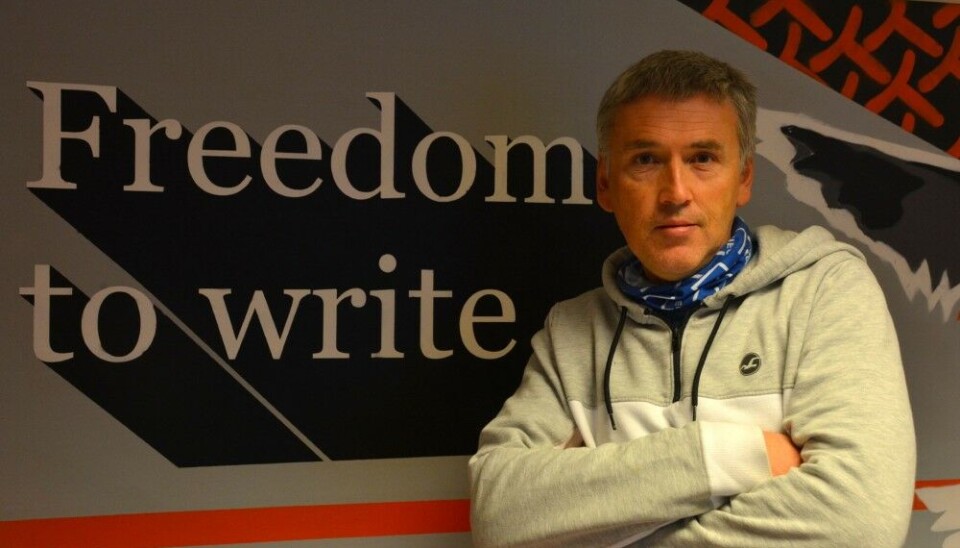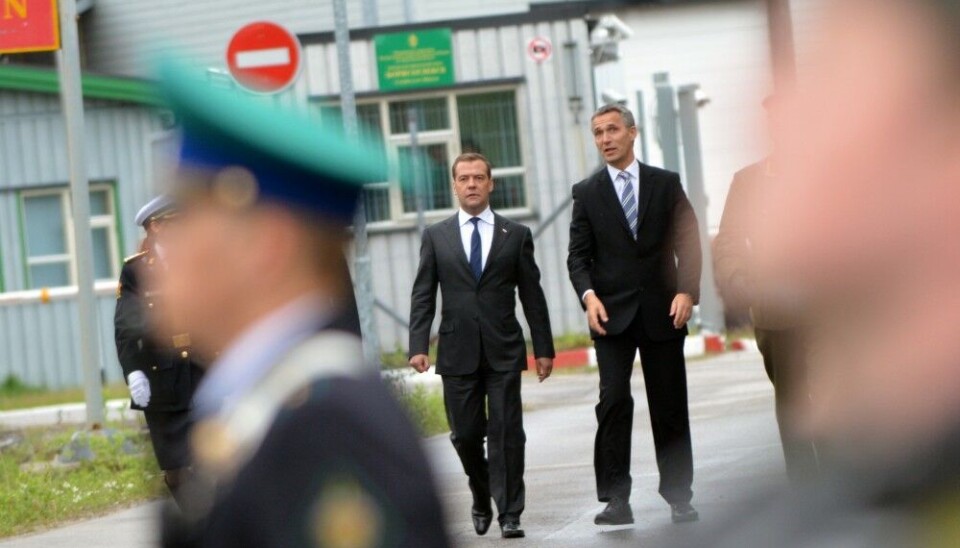
Criminalizing journalism to make us silent doesn’t work
Opinion Editorial: It was up north Vladimir Putin got his first real lesson on ‘the danger’ of free media. Killing 118 crew members, the August 2000 sinking of the Kursk submarine in the Barents Sea paralyzed the newly minted leader. His desultory response to the failed rescue operation was broadcasted worldwide. First more than a week after the catastrophe, a scared Putin aborted his vacation on the Black Sea and traveled north to meet the bereaved family members who were packed in the town hall of Vidyayevo, the closed military town less than 80 kilometers from Russia’s border with Norway. The relatives were angry but got few answers on why their authorities refused rescue help from the neighboring country in the west.
Channel One (ORT) - at the time owned by Boris Berezovsky - voiced unprecedented criticism against Putin for his failed leadership at a time of national tragedy. Slamming the President’s mishandled response also came from NTV, Echo Moskva, and Segondnya, all part of media tycoon Vladimir Gusinsky’s holding company.
Instead of denouncing the Northern Fleet’s cover-ups, lies, and contradictory information about the Kursk drama, Mr. Putin chose to blame the messengers, the media. He said TV had reporters unscrupulously trying to destroy the state, discrediting the country.
It didn’t help. Putin’s popularity hit record low in the months that followed the submarine disaster. Lessons learned: To control public opinions, the Kremlin needs to control the media. Especially if you plan to build a vertical power structure in a Federation where Boris Yeltsin for a decade had distributed powers to the regions.
In late 2000, Putin sent the Prosecutor General’s Office after Berezovsky who fled the country and later died in London. Channel One came under state control. So did the NTV, the popular TV channel that previously had hinted that FSB was behind a failed apartment-building bombing in Ryazan shortly after Vladimir Putin moved from his office in Lubyanka to become Prime Minister under Boris Yeltsin in August 1999. NTV was taken over by Gazprom-Media and the end came to its sharp analysis of current events.
One of NTV’s most prominent journalists that left NTV in protest of the takeover in early 2001 was Vladimir Kara-Murza Sr. His son is Vladimir Kara-Murza, the civil society promoter - and journalist - who last week was sentenced to 25 years by a Moscow court for telling the truth about war crimes conducted by the Russian Army in Ukraine.
His so-called treason sentence for refusing to be silenced is adding to the Kremlin’s brutal crackdown against freedom of expression we have seen since Russia’s all-out war on Ukraine on February 24, 2022.
Vladimir Putin and his war crime compatriots know perfectly well that domestic support for the military attack on Ukraine would not be possible if free journalism existed. Independent media would easily debug Putin’s increasingly paranoid worldview that now is sending tens and tens of thousands of young Russian men to their deaths as cannon fodder.
It’s not complicated. The war on Ukraine was not caused by any alleged Nazis in Kyiv, Russian history justifications, or North Atlantic Treaty Organization expansion like the narrative peddled by Moscow brings on. The order to invade was given by one crazy man living in isolation and his fellow regime supporters that need the war to stay in power.
A few days after the full-scale invasion of Ukraine, the regime speeded up adoption of repressive legislation hitting on media. Criminalizing independent journalism by introducing laws on ´discrediting´ the army and ´fake-news´ have caused charges for dozens of Russian media people. Among them are journalists Valery Badmayev, Ilya Krasilshchik, and Maria Ponomarenko, editor Mikhail Afanasyev, publisher Sergey Mikhaylov, and TV producer Marina Ovsyannikova. To name a few.
It is obvious that Putin doesn’t fear NATO, what he fears is free journalism.
Arkhangelsk student Olesya Krivtsova understands this. The young woman is on Russia’s most wanted list after she in March cut her electronic tracking bracelet and left the country for Vilnius. She was then under house arrest awaiting a trial that could give her up to 15 years in jail for sharing an anti-war post on social media. Olesya now says she wants to pursue a career in journalism.
She is most welcome to the Barents Observer. Located a 15-minute drive from Norway’s border with Russia in the north, we are currently expanding our newsroom for exile Russian journalists.
We are cooperating with UiT The Arctic University of Tromsø with an aim to contribute both to freedom of expression and to preserve Norwegian-Russian know-how in the high north with the help of Russians that have left the country for now. Academic independence for researchers in exile is equally important.
This is one contribution to the future history of a Russia derailing the current path to totalitarianism.
The Barents Observer - publishing in both Russian and English - was founded as a private initiative more than 20 years ago to bring increased understanding across borders between the Nordic north and regions in northwest Russia.
All of us that have worked as journalists inside Russia - reporting about lovely people and the challenges they have faced in post-Soviet times - have also been cleareyed about the risk the country’s dark shadows have posed to freedom of writing.
When Dmitry Medvedev came as Prime Minister to celebrate the 20th anniversary of the Barents Cooperation here in Kirkenes in 2013, his security staff requested the Norwegian organizers to remove a handful of journalists from the list to be accreditated. Those were our colleagues from regional media in Murmansk and Arkhangelsk, journalists invited by the Barents Observer. Moscow wanted full control of what was reported from the north, a region branded as High North - Low Tensions.
Norway opened the door for the north Russian journalists, and when the Kremlin’s press pool packed up their cameras, Medvedev did his best to answer questions by Murmansk reporters about why prices on cod were lower on this side of the border than at home. A few hours later could all reporters take photos of a smiling Medvedev walking side-by-side with Jens Stoltenberg across the Norwegian-Russian border. This was a short year before the illegal annexation of Crimea and Stoltenberg was Prime Minister.

In 2014, the FSB asked Norwegian authorities to bring our reporting to silence. Although a few regional politicians in northern Norway made a failed attempt to remove our editorial freedom, the Barents Observer only strengthened its belief in the importance of continuing what we are best at: Accurate, unbiased, fact-based reporting.
Independent journalism is the best tool to counter propaganda and lies. Our desire to defend this principle gets stronger with every repressive step taken by Moscow. Journalism is not a crime.
When Roskomnadzor - the Russian censorship agency - in 2019 blocked the Barents Observer we got many more readers. Logically, the attention brought by being blocked is considered a quality stamp among Russians reading the internet for truthful information. Tools to circumnavigate the Kremlin’s censorship wall are many and you can today find Barents Observer on Telegram, YouTube, podcasts, mirror domains, or simply as millions of others inside Russia: go online with VPN.
All we are doing is backed by the Russian Consitution. Article 29 is as clear as it can be:
The freedom of mass communication shall be guaranteed. Censorship shall be banned.
The Constitution, or any other rule-of-law principles for that matter, doesn’t worry Mr. Putin. He considers himself to be the law.
In a vertical power structure, lawmakers (the State Duma), law enforcement agencies, and the Justice Ministry all jump when the ruler in the bunker makes clear that journalists doing their job are enemies of the State.
With the wrongful detention and made-up espionage charges against Wall Street Journal journalist and American citizen Evan Gershkovich, Putin has hit a new low in his war on journalism. Under the definition of espionage, anyone using publicly available information can be prosecuted. Last year, journalist Ivan Safronov was sentenced to 22 years in jail. Gershkovich, however, is the first foreign journalist to become a victim under the law.
Who’s next, you wonder?
Well, several of the few remaining accredited foreign correspondents in Moscow decided not to find out and have already left the country.
Creating an atmosphere of fear is on top of FSB’s toolbox. Last week, the State Duma approved in its second reading amendments to the law on Treason in the Criminal Code. From now, any citizen can get life sentence for giving information to foreigners. Who now dares to give an interview to a journalist from Norway, or any other country?
The law amendments came the same day as the Prosecutor General’s Office labeled Norway-based environmental group Bellona as an ‘undesirable organization.’ The NGO has since the start of cross-border cooperation up north in the early 1990ties actively worked internationally to help Russia secure its Arctic nuclear waste dumps. From now, anyone providing information - or cooperating - with Bellona risks criminal charges with up to six years in jail.
In a similar wave of attempts to stop the free flow of information, the regime intensifies its crackdown on Russian exile journalists. The Barents Observer’s reporter Georgii Chentemirov was recently included in the Justice Ministry’s list of so-called ‘foreign agents’.
The ‘foreign agents’ laws have since 2012 been used by Russian authorities to smear opposition groups, media, and individuals who have expressed opinions challenging the narrative of the Kremlin. This Friday, Natalia Severts-Yermolina was included in the list. Working out of Petrozavodsk, she has for years had a goal to improve cooperation between Russian journalists up north with colleagues in the Nordic countries.
That work is more challenging than ever.
Meanwhile, the Barents Observer can only promise one thing. We continue cross-border independent reporting. Being silenced is not an alternative.
Thomas Nilsen is Editor of the Barents Observer.















